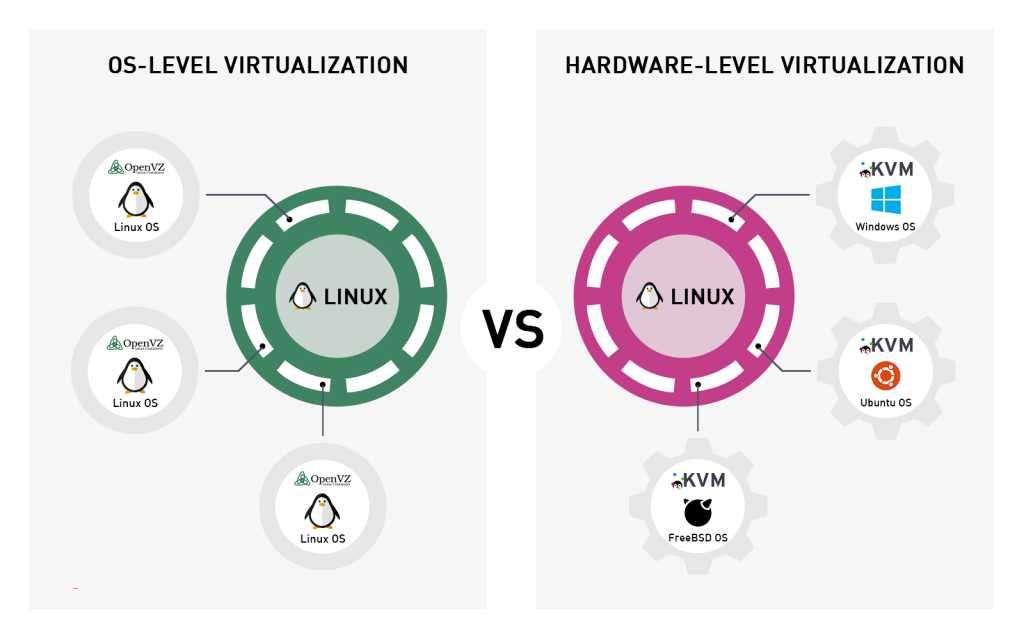Virtual Private Servers are gradually turning into a mainstream web hosting trend.
Over the last few years, the virtualization concept has so naturally interwoven into the very fabric of the hosting market that VPSs are now regarded as new-generation shared web hosting packages.
For the last years, we’ve been relying on two different virtualization technologies – Virtuozzo Containers and OpenVZ, to bring the VPS philosophy to your store. Following the latest trends on the VPS market, we are now introducing an innovative virtualization technology onboard – Linux KVM.
What is Linux KVM?
Just like Virtuozzo and OpenVZ, KVM is a Linux-based virtualization technology whereby a physical server is partitioned into a number of virtual machines, which act independently of each other, albeit sharing the server’s resources at the hardware level.
Virtualization, however, is a broad term, which leaves space for customization and adaptation to the specificities of the given hosting platform.
And this is exactly where KVM makes a difference.
The KVM virtualization technology provides a new perspective to virtualization, bringing it a step further.
It offers flexibility, which has allowed us to build a custom hybrid platform where your resource-sensitive VPS machine can reside trouble-free.
The philosophy of KVM is ‘full virtualization at the hardware level’, which allows for maximum utilization of CPU resources.
Through emulation of actual physical devices, each VPS can get a dedicated virtual chunk of the server’s CPU and even have its very own OS running on it.
The KVM technology has also allowed us to increase disk and network I/O request processing speeds by means of VirtIO paravirtualization. VirtIO is a virtualization standard for disk and network device drivers, which allows high performance to be achieved.
VirtIO drivers are available by default with most standard Linux distributions. If you are a FreeBSD or a Windows user, you should configure the drivers during the OS installation itself.
What are the differences between KVM and OpenVZ?
The main difference between KVM and the OpenVZ technology you are already familiar with is the level of virtualization.
While OpenVZ relies on OS-level virtualization where the main server’s OS is replicated across all VPSs and the kernel is shared between them, KVM offers full virtualization where the entire hardware is completely simulated, which allows you to run your very own preferred OS.
What does that difference mean for the regular VPS user?
Well, while full virtualization sounds better than partial virtualization, it is not necessarily fair to say that KVM is better than OpenVZ.
Both technologies are mature enough to ensure smooth performance for your VPS, so the right choice will depend on your particular needs.
Here is a quick comparison of the pros and cons of both technologies, so you and your customers could decide for yourselves which one will serve you better:
- supports most Operating Systems, including Linux, FreeBSD and Windows;
- offers a better insulation from the other VPSs on the root machine;
- reinforced security levels;
- open to solutions that require custom kernel modifications, patches, a specific kernel version or features not supported in OpenVZ;
- supports advanced netfilter firewall configurations like ipset, nftables, etc.
- full virtualization requires more server resources (memory, CPU) per container;
- the complete resource isolation impedes resource burstability
- requires manual installation in most cases;
- burstability of resources – one VPS may borrow resources like RAM from another VPS when the second one is not using them;
- the OS-level virtualization requires less memory and CPU resources;
- lower management complexity for customers;
- supports only Linux distributions
- not that good insulation from other machines
OS and Control Panel choices with the KVM VPS packages
Since this is a pilot project for us, we’re launching the KVM packages with a range of pre-installed OS options that are already familiar, namely:
– CentOS 6 (x86_64), CentOS 7 (x86_64)
– Debian 7 (x86_64), Debian 8 (x86_64)
– Ubuntu 12.04 LTS (x86_64), Ubuntu 14.04 LTS (x86_64)
Customers will be able to select any of the OS options on the order form and get their KVM servers set up within a few hours, just like with the OpenVZ VPS packages.
For now, users can either get a KVM without a Control Panel or choose a cPanel installation for their CentOS 6 or CentOS 7 environment at signup.
After the launch of the KVM packages, we’ll be performing extensive post-release compatibility tests with other OS instances, as well as with the in-house built Hepsia Control Panel.
We’ll keep you updated on our progress and on the dates on which the extra OS and Control Panel options will be released.
An integrated server management interface with all KVM VPSs
With the purchase of a KVM package, each customer will gain access to the SolusVM web interface, which will ensure a smooth and secure management of their server environment.
SolusVM, which is also integrated into the OpenVZ VPS packages, will allow you to manage multiple virtual servers, both OpenVZ and KVM-based, from a single location.
You can quickly reboot your VPS anytime you want, re-install the Operating System or change the root password using SolusVM’s clean, easily customizable interface.
Integrated features and upgrade services
Apart from a very good balance between server resources and price, the KVM packages also offer SSH/full root access, a dedicated IP address and a set of reseller hosting tools, among them the ClientExec billing & support software and a domain reseller account.
Each KVM is backed up by a 99.9% network uptime guarantee and is configured within 1 hour of signup, with no extra setup fees.
Weekly data backups and 24/7/365 technical support for installed applications are included as well.
NOTE: For now, we are offering KVM VPS packages in the US data center only. Just like with the OpenVZ VPS packages, KVM users will be able to get extra RAM quotas and IP addresses.
The new KVM VPS packages will replace the Virtuozzo plans
As of today, the Virtuozzo VPS packages will no longer be supported on our platform.
They will be replaced by the new KVM packages, which will be displayed on our partners’ stores in their stead.
Enabling a KVM service on our platform was a great endeavor, which cost us a great deal of time and effort.
We’d be glad to hear from you regarding this major hosting portfolio update – any feedback and suggestions will be highly appreciated and will help us further upgrade the service.







